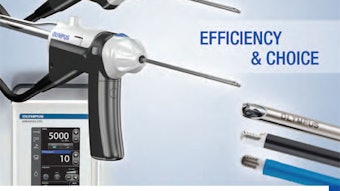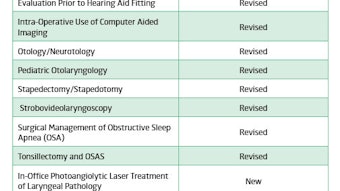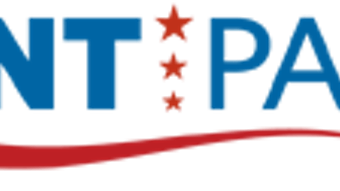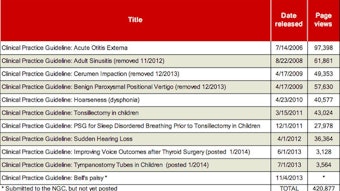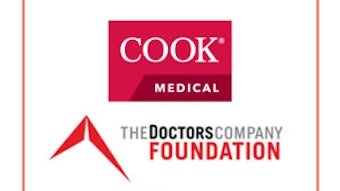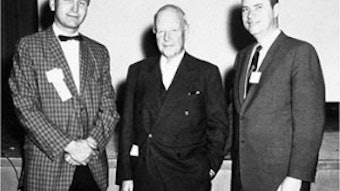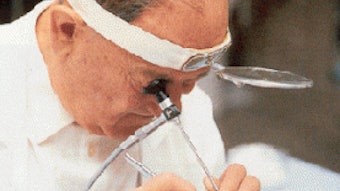Stage 3 of MU Is on the Horizon and We’re Advocating for You!
During the past few years, the Health Policy team has actively worked not only to educate members on the Centers for Medicare & Medicaid’s (CMS) Quality Initiative programs, but also to advocate on behalf of you so your needs and experiences are represented within the programs. This is particularly true with the Electronic Health Records (EHR) Meaningful Use (MU) Incentive Program, and 2014 is no exception. This year is important for a variety of reasons, one being it is the year that CMS plans to publish the notice of proposed rulemaking (NPRM) regarding Stage 3 of EHR MU. For those members not fully up-to-speed on the EHR MU program, this article includes a brief overview of the program and highlights Academy advocacy efforts as CMS develops Stage 3. [Communications insert standard language to drive members to Bulletin online.] By continuing advocacy efforts, the Health Policy team hopes to help members sort through any confusion associated with the EHR MU program, prepare for increased requirements, avoid penalties, and successfully participate, so you can focus on what matters most: providing excellent patient care. Did You Know? Rulemaking is a process that federal government agencies, such as CMS, use when developing governmental regulations. This process requires the opportunity for public comment before final regulations may be made. The Academy submits comments to CMS, and other agencies, on priority issues that impact otolaryngology-head and neck surgeons nationally. Background As you may know, the EHR MU was designed by CMS to facilitate the use of EHRs in clinical settings, with the program goals being to promote greater efficiency in healthcare, decrease costs, and improve the communication of medical information as it is shared between providers, regulators, and public health agencies. To meet those goals, eligible professionals (EPs) are expected to demonstrate they are “meaningfully using” their EHRs in such a manner that improves overall quality of care and increases patients’ choice as defined by CMS. In other words, it’s not simply a matter of utilizing EHRs, but rather, EPs and other healthcare professionals are expected to meet a number of thresholds for several objectives, with the requirements increasing as the stages of the program (1, 2, and 3) progress. For the most part, all three stages retain the same basic structure: EPs must report the required number of MU objectives + required number of clinical quality measures (CQMs) + any other reporting requirements.1 For the individual requirements, MU objectives are divided into two types: CORE and MENU. EPs are expected to report on all CORE measures but can choose the required number of MENU measures from a list based upon what best suits that individual’s practice. In addition, the MU objectives vary depending upon which stage of the program an EP is currently participating in. The requirements of each stage are designed to advance that particular stage’s chief goal (i.e., data capturing and sharing, advanced clinical processes, and improved outcomes). Stage 2 is currently underway, but Stage 3 is on the horizon with many new changes likely to impact specialists. Stage 3 AAO-HNS Comments on HITPC Recommendations for New/Heightened MENU and CORE Measures The Health IT Policy Committee (HITPC) is the federal advisory committee that makes recommendations to the Secretary of Health and Human Services (HHS) regarding the EHR MU Incentive Program. In spring 2014, the HITPC made several recommendations to CMS regarding Stage 3 requirements, which included many new or heightened MENU and CORE measures. Unfortunately, many of the recommendations are either reliant upon EHR systems that are fully interoperable or are requirements that are poorly suited for specialists, like ENTs. Since CMS considers the HITPC recommendations when developing their proposed rule, the Academy, along with other specialty societies, worked with the AMA to provide comments to CMS in hopes of changing many of the recommendations. Below is an example of one of the comments submitted by the AAO-HNS on a new MENU measure proposed by the HITPC. AAO-HNS General Comments on Stage 3: Increasing Costs for Providers In addition to commenting on the specific measures, the AAO-HNS also noted that while it supports the continued integration of EHRs into the practices of otolaryngologists-head and neck surgeons, it remains extremely concerned that the new and expanded requirements under Stage 3 will be increasingly difficult for otolaryngologists to meet, especially in light of the increased costs associated with meeting the higher standards and the additional maintenance required without the possibility of receiving incentive payments in coming years. The AAO-HNS further commented that because providers are also responsible for the expenses associated with implementing the core, menu and clinical quality objectives, it is imperative that flexibility be built into the program, which is currently lacking. As many can agree, flexibility helps ensure not only the continued adoption of HIT, but also avoids hindrances to patients’ access to quality care. AAO-HNS Health Policy Team Provides Resources to Members As rulemaking continues, the AAO-HNS will continue to stay actively engaged in the process and will keep members apprised of all pertinent information relating to the program. Members are also encouraged to stay engaged. View invaluable tools created by the AAO-HNS Health Policy team (available at: http://www.entnet.org/Practice/ONC.cfm) to help you understand the program and prepare your practice: AAO-HNS EHR MU webpage AAO-HNS EHR MU Fact Sheet Members should also stay tuned in to the eNews, HP Update, Bulletin, website, and other outreach tools for any announcements on important changes, deadlines, or other key factors surrounding the program. 1. Please note: This article is designed to provide a brief overview of the EHR MU Incentive Program and does not describe many pertinent aspects, such as the CQM requirements or other requirements that are essential to successfully participating in the program. Because of such, members are encouraged to review the resources listed on the Academy’s EHR webpage to ensure they fully understand the program and its implications.
During the past few years, the Health Policy team has actively worked not only to educate members on the Centers for Medicare & Medicaid’s (CMS) Quality Initiative programs, but also to advocate on behalf of you so your needs and experiences are represented within the programs. This is particularly true with the Electronic Health Records (EHR) Meaningful Use (MU) Incentive Program, and 2014 is no exception. This year is important for a variety of reasons, one being it is the year that CMS plans to publish the notice of proposed rulemaking (NPRM) regarding Stage 3 of EHR MU.
For those members not fully up-to-speed on the EHR MU program, this article includes a brief overview of the program and highlights Academy advocacy efforts as CMS develops Stage 3. [Communications insert standard language to drive members to Bulletin online.] By continuing advocacy efforts, the Health Policy team hopes to help members sort through any confusion associated with the EHR MU program, prepare for increased requirements, avoid penalties, and successfully participate, so you can focus on what matters most: providing excellent patient care.
Did You Know?
Rulemaking is a process that federal government agencies, such as CMS, use when developing governmental regulations. This process requires the opportunity for public comment before final regulations may be made. The Academy submits comments to CMS, and other agencies, on priority issues that impact otolaryngology-head and neck surgeons nationally.
Background
As you may know, the EHR MU was designed by CMS to facilitate the use of EHRs in clinical settings, with the program goals being to promote greater efficiency in healthcare, decrease costs, and improve the communication of medical information as it is shared between providers, regulators, and public health agencies. To meet those goals, eligible professionals (EPs) are expected to demonstrate they are “meaningfully using” their EHRs in such a manner that improves overall quality of care and increases patients’ choice as defined by CMS. In other words, it’s not simply a matter of utilizing EHRs, but rather, EPs and other healthcare professionals are expected to meet a number of thresholds for several objectives, with the requirements increasing as the stages of the program (1, 2, and 3) progress. For the most part, all three stages retain the same basic structure: EPs must report the required number of MU objectives + required number of clinical quality measures (CQMs) + any other reporting requirements.1
For the individual requirements, MU objectives are divided into two types: CORE and MENU. EPs are expected to report on all CORE measures but can choose the required number of MENU measures from a list based upon what best suits that individual’s practice. In addition, the MU objectives vary depending upon which stage of the program an EP is currently participating in. The requirements of each stage are designed to advance that particular stage’s chief goal (i.e., data capturing and sharing, advanced clinical processes, and improved outcomes). Stage 2 is currently underway, but Stage 3 is on the horizon with many new changes likely to impact specialists.
Stage 3
- AAO-HNS Comments on HITPC Recommendations for New/Heightened MENU and CORE Measures
The Health IT Policy Committee (HITPC) is the federal advisory committee that makes recommendations to the Secretary of Health and Human Services (HHS) regarding the EHR MU Incentive Program. In spring 2014, the HITPC made several recommendations to CMS regarding Stage 3 requirements, which included many new or heightened MENU and CORE measures. Unfortunately, many of the recommendations are either reliant upon EHR systems that are fully interoperable or are requirements that are poorly suited for specialists, like ENTs.
Since CMS considers the HITPC recommendations when developing their proposed rule, the Academy, along with other specialty societies, worked with the AMA to provide comments to CMS in hopes of changing many of the recommendations. Below is an example of one of the comments submitted by the AAO-HNS on a new MENU measure proposed by the HITPC.
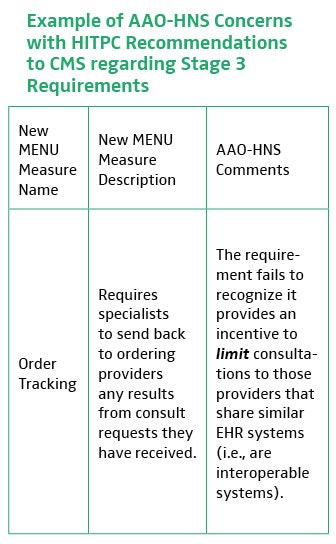
- AAO-HNS General Comments on Stage 3: Increasing Costs for Providers
In addition to commenting on the specific measures, the AAO-HNS also noted that while it supports the continued integration of EHRs into the practices of otolaryngologists-head and neck surgeons, it remains extremely concerned that the new and expanded requirements under Stage 3 will be increasingly difficult for otolaryngologists to meet, especially in light of the increased costs associated with meeting the higher standards and the additional maintenance required without the possibility of receiving incentive payments in coming years. The AAO-HNS further commented that because providers are also responsible for the expenses associated with implementing the core, menu and clinical quality objectives, it is imperative that flexibility be built into the program, which is currently lacking. As many can agree, flexibility helps ensure not only the continued adoption of HIT, but also avoids hindrances to patients’ access to quality care.
- AAO-HNS Health Policy Team Provides Resources to Members
As rulemaking continues, the AAO-HNS will continue to stay actively engaged in the process and will keep members apprised of all pertinent information relating to the program. Members are also encouraged to stay engaged. View invaluable tools created by the AAO-HNS Health Policy team (available at: http://www.entnet.org/Practice/ONC.cfm) to help you understand the program and prepare your practice:
- AAO-HNS EHR MU webpage
- AAO-HNS EHR MU Fact Sheet
Members should also stay tuned in to the eNews, HP Update, Bulletin, website, and other outreach tools for any announcements on important changes, deadlines, or other key factors surrounding the program.
1. Please note: This article is designed to provide a brief overview of the EHR MU Incentive Program and does not describe many pertinent aspects, such as the CQM requirements or other requirements that are essential to successfully participating in the program. Because of such, members are encouraged to review the resources listed on the Academy’s EHR webpage to ensure they fully understand the program and its implications.
